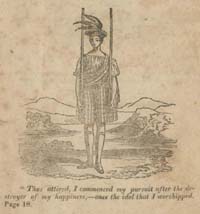Elizabeth M’Dougald
Elizabeth M’Dougald was a Scottish woman whose husband abandoned her for another woman. She pursued him with murderous intentions, disguising herself as a man along the way. According to The Life, Travels, and Extraordinary Adventures of Elizabeth M’Dougald (Providence, 1834), M’Dougald crossed the Atlantic in 1826, traveled throughout Canada and the United States, and enlisted in the Army. Though it is unclear whether the narrative is fictitious or based on fact, it was published at a time when stories of adventurous, cross-dressing women abounded.
Credit for authorship is given to M’Dougald and it was “published with her direction.” Again, we have an instance of a woman, by her own volition, presenting herself as extraordinary. M’Dougald’s adventure was only possible through the alteration of her body. In the text, she writes:
In the progress of my journey across the Alleghany mountains it was my misfortune to receive repeated insults from passengers and travellers, to me strangers, in consequence of my apparent unprotected condition; and I blush to say, that at the hands of some of my own sex, I witnessed acts of unkindness, which were as cruel and ungenerous in them as they were derogatory to the whole sex. The most vexatious and inquisitorial inquiries were made of me, at the various hotels or taverns that we stopped at; and because I was alone, the purity of my fame, and the ability of my means were equally doubted. In consequence of this, I not unfrequently was subjected to sad and positive annoyances; and these too of a nature that demanded of me, in justice to the dignity of my sex, the most unequivocal and decided testimonials of resentment and disapprobation. In one instance a stage coach passenger, presuming on my unprotected condition had the hardihood to indelicately place his hand upon my person… firmly resolving that I would not again subject myself to the repeated insults that I had experienced whilst crossing the mountains - I determined to make the remainder of the journey in the guise of a Scottish Highlander. (The Life, Travels, and Extraordinary Adventures of Elizabeth M’Dougald, p. 17-18)
As M’Dougald states in the passage, disguising her body was a means to a tangible end -- the ability to travel freely. The implication is that the female body is inherently “odd,” for that body is restricted from particular behaviors without the accompaniment of an “ordinary” body, i.e., a male body. In cross-dressing, M’Dougald re-aligns her body to fit within the bounds of normality. The previous passage also highlights the ways in which women, as well as men, impose gendered expectations on one another.
